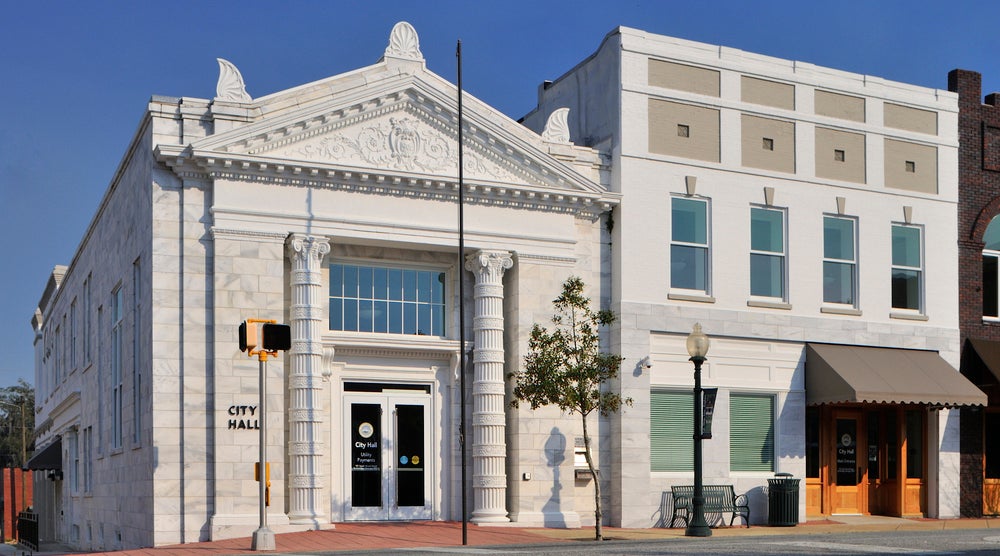Bainbridge City Council hears first reading of bond ordinance
Published 12:18 pm Wednesday, April 23, 2025


|
Getting your Trinity Audio player ready...
|
The Bainbridge City Council met for their monthly meeting last Tuesday evening. Before moving on to business, Rollins Miller took to the podium to address the council about a proposed “build-to-rent” ordinance. He spoke against the ordinance, citing concerns over scaring away developers with extra regulations, property rights, and potential “unintended consequences.” After Miller finished speaking, Coucnilman Kregg Close took to the podium to address them as a citizen. Close spoke about an incident that had happened the preceding Saturday, pertaining to violations of the downtown alcohol ordinances and instances of public urination that occurred at private party downtown.
Following this, Mayor Edward Reynolds read a proclamation declaring April as Donate Life Month, presenting the proclamation to June Faircloth.
Then, Mayor Reynolds presented the Employee of the Quarter Award to Travis Campbell with the city’s sanitation department.
The next business item on the agenda was a consideration of auditing services, specifically continuing the services of Mauldin and Jenkins, which was the lowest bid. The council voted to continue with their services.
Next, City Manager Roy Oliver presented an amendment to the city’s employee personnel policies handbook. The draft of the amendment, Oliver said, was presented to the council back in March, during the council’s retreat, and the changes had been approved. The council voted to approve the amendment.
Following this, the council had a first reading of a third supplemental bond ordinance. These ordinances pertained to bonds the city was seeking for a sewer line repair project, as well as for the city’s fiber project. Michael Kozlarek spoke to the council about the matter.
“The council recalls back in 2021, the city issued $60 million in combined utilities revenue bonds,” Kozlarek said. “During that process, there was a general bond ordinance adopted. There was a supplemental bond ordinance to make certain changes to that bond ordinance, that were related largely to the insurance requirements. Then there was a second supplemental bond ordinance that included the specifics of that actual transaction.”
He went on to explain that in order to issue more bonds for these projects, the city would have to create a third supplemental bond ordinance, and proposed having the first reading at that night’s meeting.
“Of course, the city council knows any kind of revenue bond done in the State of Georgia, it has to be validated in the Superior Court,” Kozlarek said. “In order to begin that process, rather than wait until after the two readings of the ordinance, which would put us in May, I understand there is some alacrity with which the city needs to move at least with respect to one of the new projects, and so we are proposing the first reading of the third supplemental bond ordinance tonight, as well as a resolution that sets the parameters, and that would allow us to go to the Superior Court and begin the validation process.”
The bonds are not to exceed $3.5 million, and the longest the bonds would be outstanding would be December 1, 2056, though Kozlarek stated the more accurate date would be closer to 2044. The maximum debt service for any year, Kozlarek said, could be $1,125,000.
“Again, that number may seem very high, it is. The agent believes that number is probably more in the $415,000 per year range,” Kozlarek said.
After the presentation, Councilwoman Glennie Bench asked a question about the abbreviation of the process that was being done and whether or not that was allowed. Following Kozlarek’s explanation, the stand was opened to any audience members who may have questions.
Yvena Merritt stood, raising issue with the council about Kozlarek’s involvement with the Safer Human Medicine project.
“I would like to know, given this attorney’s past and his dealings with Safer Human Medicine… my question is, the citizens within the city limits of Bainbridge, should we be dealing with an attorney with such conflicts?”
Mayor Reynolds asked Merritt whether or not she lived within the city of Bainbridge, and therefore whether or not she was a taxpayer, and responded to her question about dealing with Kozlarek as “That’s our decision to make.”
Kozlarek responded to Merritt’s statements. “I am licensed in four states. I have taken the BAR Exam once in each of those states, including the professional responsibility portion of the BAR in each of those states,” he said. “I do not,” he continued, “nor have I ever represented Safer Human Medicine. I have no affiliation with that company. The bond work I did was for the Authority, who hired me… I don’t understand what the issue is. But the idea that someone can stand up, and essentially smear me at a public meeting, I find troubling.”
Following this exchange, Councilwoman Bench would again explain the purpose of these bond ordinances, that being for sewer repair and the city’s fiber project.
The council voted to approve both the first reading, as well as the bond resolution.
Next, Steve O’Neil presented two planning commission recommendations to the council, one being a rezoning request by Beacon on Boulevard, Inc., and the second being the introduction of the previously discussed build-to-rent ordinance. The council voted to approve the rezoning, while the ordinance will be voted on later.
The next item on the agenda was a public hearing on the 2025 Bainbridge Comprehensive Plan. This plan has been in development for roughly a year, with several public input sessions, the last of which was held in January. John Ford spoke on behalf of Robert & Company, the consulting firm that has been working on this project. Ford informed the council that at that night’s meeting, they would merely be voting on forwarding the draft plan to the Regional Commission of Southwest Georgia.
“Southwest Georgia will also pass this draft plan to the State Department of Community Affairs,” Ford explained. “They will make whatever comments they need to make. They primarily review it for form, and to make sure the requirements meet the requirements of the Planning Enabling Act.”
The public hearing was closed with no additional comments from the public, and the council voted to forward the plan to the regional commission.
After this, the council heard the introduction of an amendment to Ordinance 518, regarding the City of Bainbridge Cemetery Trust. The amendment would open the trust to all cemeteries the city owns, and would also establish a Cemetery Committee, which would be comprised of seven members to be appointed by the mayor.
The next item on the agenda was the consideration of a lease agreement for the BPS training center kitchen. The bid was from Nessa’s Southern Cuisine in Climax. The lease amount was $1,000 per month, plus additional utilities. The council voted to accept the lease agreement.
As the meeting wound down, the council heard a resolution pertaining to the project at the Warehouse at Calhoun Street, with the name of the company involved being changed from the Brent Warr Company, LLC, to The Warehouse at Calhoun, LLC. The resolution stated that the city would continue to endorse the project under the business’s new name. The council approved the resolution.
Next, the council approved a special event use application for the Earle May Boat Basin for that weekend.
Lastly, the council heard a bill for property and liability insurance from GIRMA, with a cost of $506,968. The bill was approved.
Following this, the meeting was adjourned.






